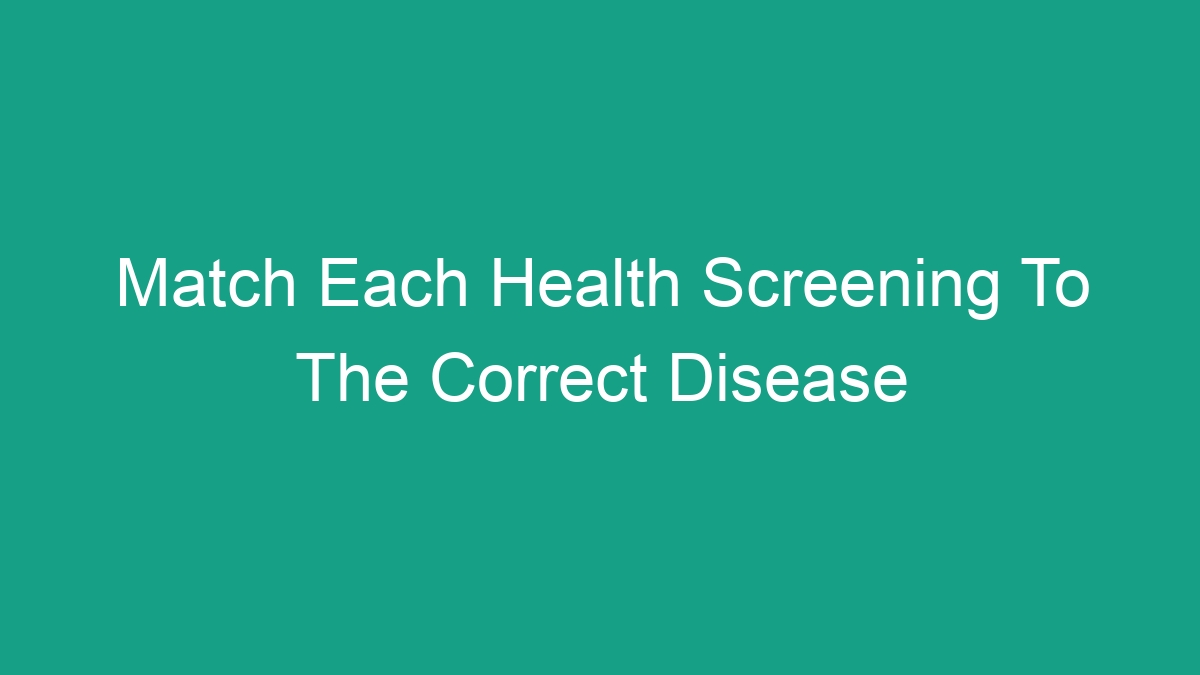
Health screenings are an essential part of preventive medicine. By detecting potential health problems early, screenings can help reduce the risk of serious illness and improve overall health outcomes. However, it’s important to match the appropriate health screening to the correct disease in order to maximize their effectiveness. In this article, we will discuss various health screenings and the diseases they are designed to detect.
Blood Pressure Screening – Hypertension
- What is blood pressure screening? Blood pressure screening is a simple, non-invasive test that measures the force of blood against the walls of your arteries.
- Why is it important? High blood pressure, or hypertension, can lead to serious health problems such as heart disease, stroke, and kidney disease if left untreated.
- Who should get screened? Adults should have their blood pressure checked at least once a year, or more frequently if they have risk factors for hypertension.
Cholesterol Screening – Cardiovascular Disease
- What is cholesterol screening? Cholesterol screening measures the levels of cholesterol and triglycerides in your blood.
- Why is it important? High cholesterol levels can increase the risk of cardiovascular disease, including heart attack and stroke.
- Who should get screened? Adults should have their cholesterol levels checked every four to six years, or more frequently if they have risk factors for heart disease.
Colonoscopy – Colorectal Cancer
- What is a colonoscopy? A colonoscopy is a procedure that allows a doctor to examine the inside of the colon and rectum using a flexible tube with a small camera attached.
- Why is it important? Colonoscopies can detect precancerous polyps and early-stage colorectal cancer, which can be treated more effectively when found early.
- Who should get screened? Adults at average risk for colorectal cancer should start screening at age 45, while those with a family history of the disease or other risk factors may need to start earlier.
Mammogram – Breast Cancer
- What is a mammogram? A mammogram is an X-ray of the breast that is used to detect breast cancer in its early stages.
- Why is it important? Early detection of breast cancer can lead to more treatment options and a better chance of survival.
- Who should get screened? Women should start getting mammograms at age 40 and continue to do so every one to two years, depending on their risk factors.
Pap Smear – Cervical Cancer
- What is a pap smear? A pap smear is a test that collects cells from the cervix to detect abnormalities that could lead to cervical cancer.
- Why is it important? Cervical cancer is highly preventable with regular screening and appropriate follow-up care.
- Who should get screened? Women should start getting regular pap smears at age 21 and continue to do so every three years, with the option to switch to every five years after age 30 if combined with HPV testing.
Blood Glucose Test – Diabetes
- What is a blood glucose test? A blood glucose test measures the amount of sugar in your blood, which can help detect diabetes or prediabetes.
- Why is it important? Untreated diabetes can lead to serious complications, including heart disease, stroke, kidney disease, and vision loss.
- Who should get screened? Adults should be tested for diabetes every three years starting at age 45, or at a younger age if they have risk factors such as being overweight or having a family history of diabetes.
It’s important to note that these are just a few examples of health screenings available to detect various diseases. There are many other screenings and tests that your healthcare provider may recommend based on your age, sex, family history, and other risk factors. By staying up to date on your screenings and following your provider’s recommendations, you can take an active role in maintaining your health and preventing disease.
Frequently Asked Questions (FAQ)
1. Are health screenings covered by insurance?
Many health insurance plans cover preventive screenings at no cost to the patient. It’s important to check with your insurance provider to understand what’s included in your plan.
2. What if I have a family history of a certain disease?
If you have a family history of a specific disease, such as breast cancer or colon cancer, your healthcare provider may recommend starting screenings at an earlier age or having them more frequently. It’s important to communicate your family history to your provider so they can make the best recommendations for your individual situation.
3. Are there alternative screening methods available?
For some diseases, alternative screening methods may be available, such as non-invasive tests for colorectal cancer. It’s important to discuss all available options with your healthcare provider to determine the best approach for your health needs.
4. What if a screening test comes back abnormal?
If a screening test comes back with abnormal results, your healthcare provider will work with you to determine the appropriate next steps, which may include additional testing, follow-up appointments, or referrals to specialists for further evaluation and treatment.
5. Is it ever too late to start getting screenings?
It’s never too late to start prioritizing your health. Even if you’ve never had a specific screening before, it’s important to discuss your health history and any concerns with your healthcare provider to create a plan that’s right for you.
By matching each health screening to the correct disease and following recommended guidelines, you can play an active role in protecting your health and well-being. Always consult with your healthcare provider for personalized advice and recommendations based on your individual health needs and risk factors.



